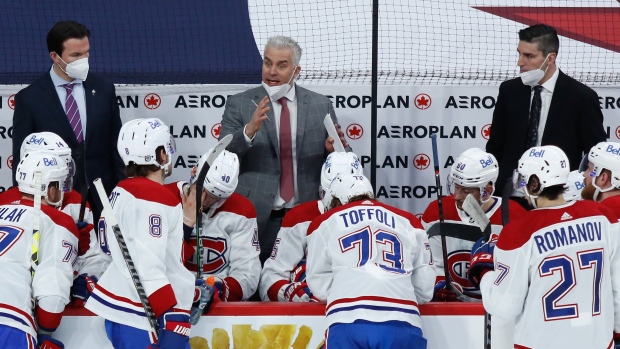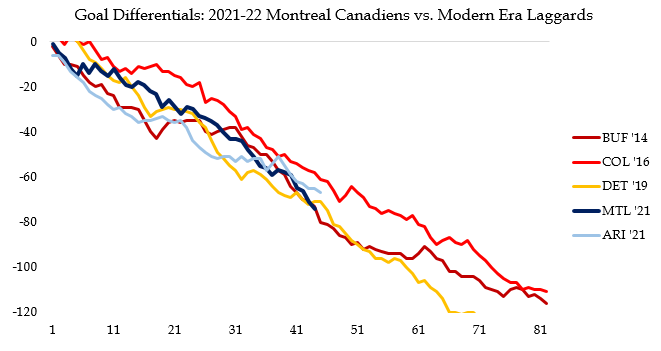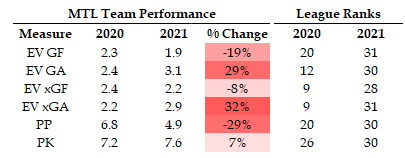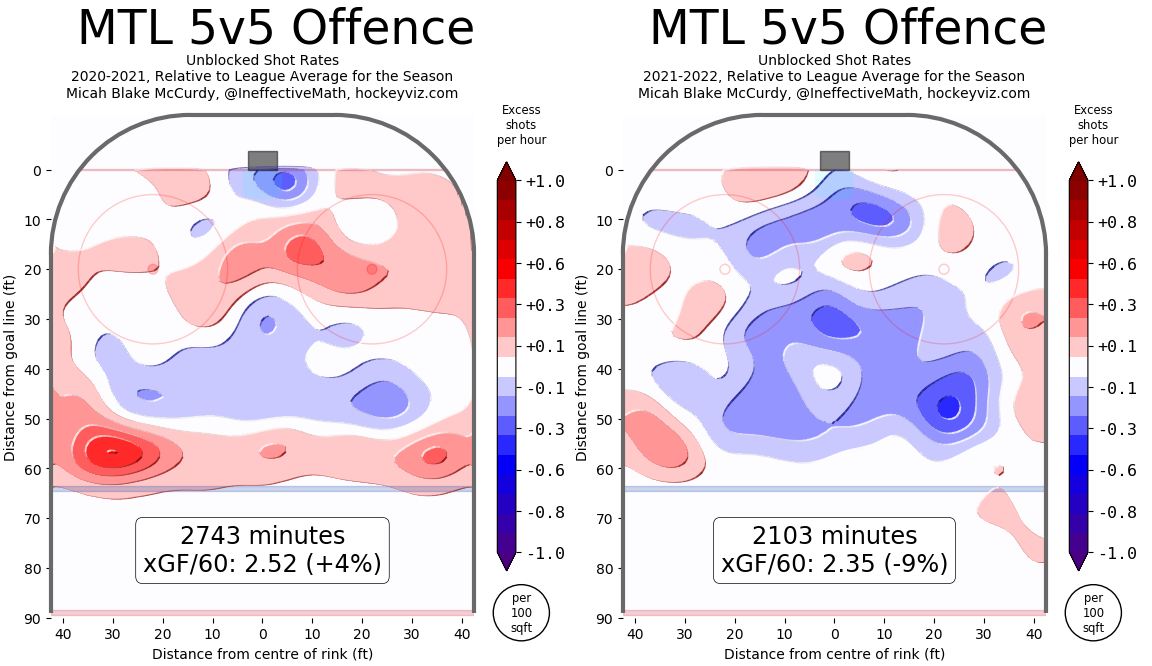Feb 4, 2022
Canadiens are suffering a stunning slide
A team that competed in the Stanley Cup Final a year ago has a shot at finishing with the worst regular-season performance in the modern era of statistics, Travis Yost writes.
By Travis Yost

To say there were headwinds coming into this season for the Montreal Canadiens would be an understatement.
With the captain on long-term injured reserve, the franchise goaltender in the NHLPA’s player assistance program, two centres lost to free agency and the salary cap an utter mess, the upside was difficult to see.
A lot has happened since last summer in Montreal, little of it good. The team currently has seven players on injured reserve. The front office has been gutted. And, for the most part, Canadiens fans just want this regular season to end. Who can blame them?
That said, the slide of this team – a team that competed in the Stanley Cup Final a year ago, I remind you – has been stunning. This isn’t just a lineup that’s really struggling to find their way, buried in poor shooting luck or void of any goaltending. The parts are bad. The sum of the parts is worse. If you hadn’t watched a single Canadiens game, you would assume this team was tanking.
But that can’t be true either. We have seen teams tank regular seasons in the hopes of chasing a lottery pick. The 2014-15 Buffalo Sabres did it in preparation for the Connor McDavid and Jack Eichel lottery race. The 2021-22 Arizona Coyotes lineup is another example; the motivation is less clear, but when virtually your entire lineup will contractually expire at season’s end, the path to competitive hockey doesn’t exist.
What do these teams have in common? They were better hockey teams. In fact, the Canadiens have a shot at finishing this year with the worst regular-season performance in the modern era of statistics (2007-22), a stunning indictment of how far this franchise has fallen.
By cumulative season goal differential, compare the Canadiens against the most futile teams (2007-22) and this year’s punting Coyotes:

Plainly put, the Canadiens are tracking on parallel path with a team that was actively trying to lose, and a 2019-20 Red Wings team The Hockey News referred to as the worst NHL club of the last two decades.
So, where is it breaking down for Montreal? Let’s compare them year-over-year to the Canadiens of last season – a very similar team, it should be noted – that played average hockey in the regular season before getting white-hot in the playoffs.

It would be easy to look at this season and say the Canadiens are terrible in every facet of the game. But I’m intrigued by one of the key shifts we have seen with this team year-over-year, and that’s their ability to dictate the run of play.
Heading into the 2020-21 playoffs, there were concerns about how Montreal would fare against better competition. But one critical point in their favour was they played with the puck a lot of time. That not only means applying sustained offensive-zone pressure, it means not defending the run of play against quality attackers.
The Canadiens were also void of shooting talent last season, but they played most of their even-strength shifts in the offensive or neutral zones, where the risk/reward ratio is favourable. Canadiens fans have understandably been clamouring for more finishing skill in the lineup, but one way to combat that deficiency is through pure volume. And for a time, Montreal was doing it.
That has completely disappeared this season, and the goals have unsurprisingly followed. If you look at a year-over-year shot profile for the Canadiens (I’ll use 5-on-5 as an example, via HockeyViz), you can see just how aggressively the shots dried up:

Last year’s team did not have a potent offence. Their inability to convert shots into goals at a rate the league might expect did hold them back, but that glosses over just how much time of possession Montreal had, and more importantly, how little their opponents did. There are many ways to score goals (or deter goals against), and doing it through pace and shot volume is usually a profitable path.
That’s why you are seeing degradation everywhere this season. The offence falling off a cliff at the same time the defence and goaltending can’t get out of their own way is interrelated: shifts are about survival, not winning.
The difference between these Canadiens and some of these other laggards of the past 15 years, generally, is that those teams under-invested in their roster to chase the future. Montreal’s current and forward-looking cap expenditures are heavy.
Jeff Gorton and Kent Hughes have a whale of a job ahead of them.
Data via Natural Stat Trick, NHL.com, Evolving Hockey, HockeyViz

